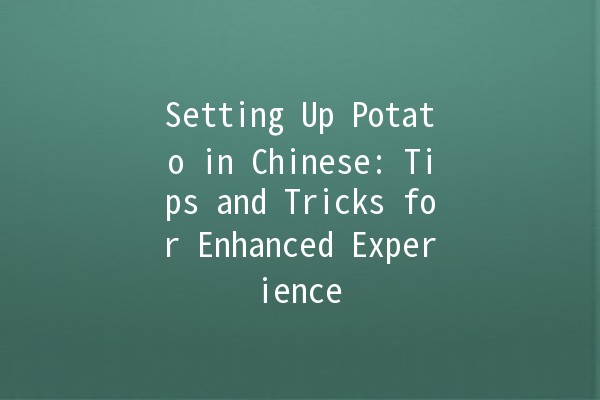Setting up software can often feel daunting, especially for those who are stepping into a new digital environment. For the Chinesespeaking community, the process of setting up the Potato software presents a unique set of challenges and opportunities. In this article, we will explore practical tips and strategies to navigate this software, ensuring a smooth experience for all users.
Understanding Potato Software: What You Need to Know
Potato, a versatile software platform, caters to various user needs ranging from gaming, productivity, and data analysis. Understanding its primary functions can help users tap into its full potential. Before diving into setup specifics, it’s essential to grasp a few key points about the software:
User Interface: Potato is designed with usability in mind. Its interface is intuitive, making navigation straightforward once familiar.
Community Support: Being widely adopted, there’s a rich community forum where users share tips, tricks, and troubleshooting advice tailored for Chinesespeaking audiences.
Now that we've established a foundational understanding, let’s delve into specific tips to enhance your Potato experience.
When you first download Potato, it may default to English or another language. To customize your experience in Chinese, follow these steps:

Practical Application:
After switching to Chinese, users often find it easier to access features and understand functions, especially in a collaborative environment. Group projects can utilize these settings to facilitate smoother communication among team members.
Potato allows for integration with various productivity tools such as calendars, task managers, and communication platforms. Setting these up can significantly streamline your workflow. Common integrations include:
Calender Sync: Synching with Google Calendar helps in managing deadlines and reminders.
Task Managers: Tools like Todoist or Trello can be linked to track project tasks seamlessly.
Communication Tools: Integrating platforms like WeChat for updates and discussions can enhance teamwork.
Example:
A project manager can set up task reminders from Trello in Potato and channel updates through WeChat. This creates a cohesive system where everyone is on the same page regarding their deadlines and responsibilities.
Potato provides several customization options to alter the user interface, catering to personal preferences or organizational branding. Users can adjust:
Theme Settings: Switch between light and dark modes.
Layout Adjustments: Modify the arrangement of toolbars and panels for your convenience.
Font and Size Adjustments: Change visual settings for better readability.
Practical Application:
A visually pleasing workspace can improve focus and productivity. For instance, switching to dark mode can reduce eye strain during prolonged use, making it easier to concentrate on tasks.
Using keyboard shortcuts can dramatically enhance your efficiency in Potato. Familiarize yourself with essential shortcuts to minimize the time spent navigating menus:
Ctrl + N: Create a new document.
Ctrl + S: Save your work.
Ctrl + Shift + A: Access recent files.
Ctrl + Z: Undo actions quickly.
Example:
In a fastpaced workflow, rather than clicking through multiple menus to save a document, pressing Ctrl + S allows users to focus more on content creation rather than operational logistics.
One often overlooked aspect of using software like Potato is the value of community interaction. Engaging with forums and social media groups dedicated to Potato users can yield valuable insight:
Share experiences with other users who have faced similar challenges.
Discover creative ways to use the software that you may not have considered.
Stay updated on the latest features or updates that could impact your usage.
Application:
For instance, a graphic designer might post on a community forum asking for tips on using Potato for editing graphics. Responses could include tricks for optimizing image quality or integrating with Photoshop, thus broadening their knowledge base.
Frequently Asked Questions
If you're encountering installation issues, verify your internet connection and ensure you're downloading the correct version. Often, uninstalling and reinstalling the software can resolve persistent problems. Most installation guides include solutions for common issues faced by users in Chinese localization.
Yes, reverting back to English or any other language is easy. Simply follow the same steps in the language settings and select your preferred language. This flexibility allows teams that include bilingual members to collaborate more effectively.
Potato excels with features like workflow automation, template usage for recurring tasks, and customizable dashboards that allow users to prioritize effectively. Leveraging these tools can save significant amounts of time.
Yes, Potato offers a mobile app that retains most functionalities of the desktop version. This allows users to access their work anywhere and maintain productivity outside the traditional office setting.
Potato typically releases major updates biannually, with smaller patches and bug fixes rolled out monthly. Users are advised to stay subscribed to community newsletters for the latest information and updates.
Users can access a variety of resources including official documentation, tutorial videos, and community forum support. For more complex issues, direct support through email or chat is also available.
By considering these strategies and leveraging the power of community and features, users can maximize their experience with Potato, enhancing their workflows and productivity levels significantly. Happy using! 🚀